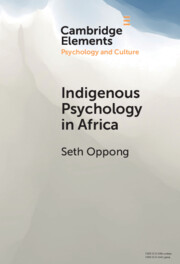Element contents
Indigenous Psychology in Africa
Published online by Cambridge University Press: 29 April 2024
Summary
Keywords
- Type
- Element
- Information
- Online ISBN: 9781009392860Publisher: Cambridge University PressPrint publication: 23 May 2024
References
- 3
- Cited by

